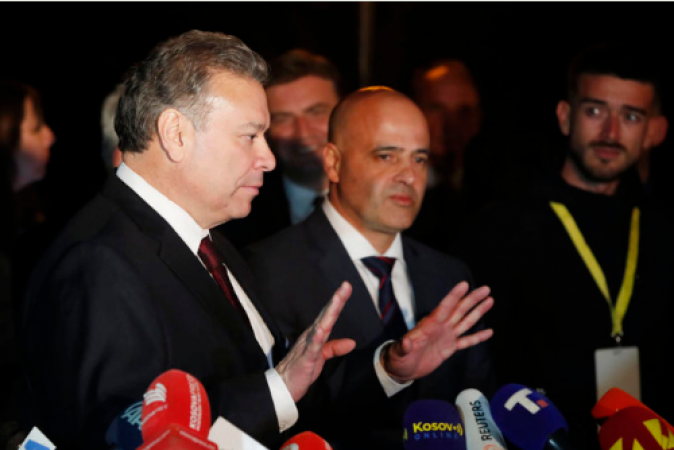
Orhid: After decades of tension between the two Balkan wartime adversaries, the leaders of Serbia and Kosovo have made a preliminary agreement on how to carry out a plan sponsored by the European Union to mend their relations. Josep Borrell, the head of the EU's foreign policy, made the announcement after presiding over talks between them on Saturday.
Aleksandar Vucic of Serbia and Albin Kurti of Kosovo "have reached an agreement on how to do it," Borrell said at a news conference after nearly 12 hours of negotiations in the lakeside resort of Ohrid in North Macedonia.
They agreed last month to the language of an 11-point EU plan to mend fences after the neighbours' war in 1998–1999 and Kosovo's 2008 declaration of independence from Serbia.
Also Read: The Pentagon invests in private internet monitoring companies NewsGuard and PeakMetrics
The goal of today was to come to a consensus on how to carry out the agreement reached at the most recent high-level meeting, according to Borrell. This entails concrete instructions on what must be done, when, by whom, and how.
Both nations have expressed a desire to one day join the European Union, but they have been advised to first mend their diplomatic relations. The need to resolve the conflict between Serbia and Kosovo has increased as the conflict in Ukraine rages and concerns grow that Russia may attempt to sow unrest in the volatile Balkans, where it has long held sway.
Borrell stated that even though "a more ambitious text" than the one the parties accepted was initially proposed at the beginning of Saturday's negotiations, "it will become an integral part of their respective texts."
On this more specific proposal, the parties were unable to come to an agreement, according to Borrell. Serbia previously stated a principle not to sign even though they are prepared to implement, whereas Kosovo lacked flexibility on the agreement's core provisions.
Also Read: President Guillermo Lasso is facing impeachment proceedings
"It is obvious that this agreement will be very beneficial for both parties, as the dialogue is not just between Kosovo and Serbia. It is about the overall region's stability, security, and prosperity, according to Borrell.
According to the EU plan, the two nations must uphold cordial ties with one another and acknowledge each other's official documents and national emblems. If put into effect, Belgrade would be prevented from obstructing Kosovo's efforts to apply for membership in the UN and other international organisations.
The agreement, which was drafted by France and Germany and supported by the US, does not specifically demand that Kosovo and Serbia recognise one another.
Serbia's populist President Vucic appeared to rethink some of the EU plan's tenets after pressure from far-right organisations that view Kosovo as the birthplace of the Serbian state and Orthodox religion, despite initially appearing to support it.
At the Ohrid meeting, Vucic declared on Thursday that he "won't sign anything," as he had earlier vowed never to recognise Kosovo or permit its UN membership. Even though Kurti insisted, he reiterated on Saturday that he had not signed the implementation document.
Today wasn't particularly a "D day," but it was a good day, according to Vucic. "We have important and challenging tasks ahead of us in the coming months."
Kurti, on the other hand, took issue with Vucic's failure to sign the implementation agreement on Saturday. It is now up to the EU to make it internationally enforceable, according to Kurti. Kosovo is a former Serbian province with a large ethnic Albanian population.
When separatist ethnic Albanians rebelled against Serbian rule in 1998-1999, Belgrade crushed them with brutal force. Aproximately 13,000 people perished, primarily Albanians. Serbia was forced to leave the region in 1999 as a result of a NATO military intervention. In 2008, Kosovo proclaimed its independence.
Since then, tensions have been building. Numerous Western nations have formally recognised Kosovo's independence. Belgrade, however, is opposed to it and is supported by both Russia and China. Talks mediated by the EU have not advanced much in recent years.
Also Read: Trump: The US poses the biggest threat to Western civilization
Due in part to Moscow's opposition to Kosovo's independence and potential veto over its UN membership at the Security Council, Serbia has continued to maintain close ties with its traditional Slavic ally Russia despite the conflict in Ukraine.